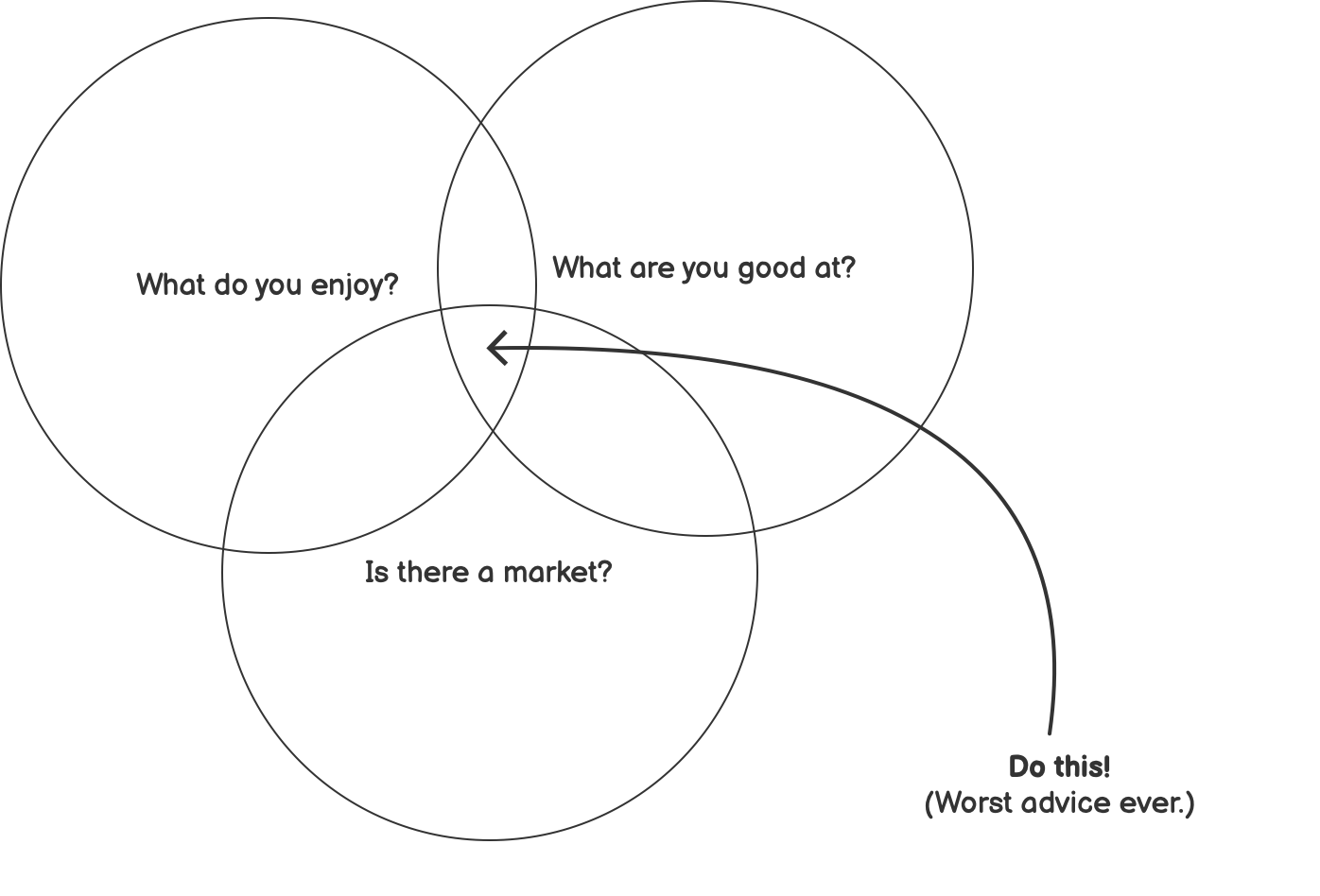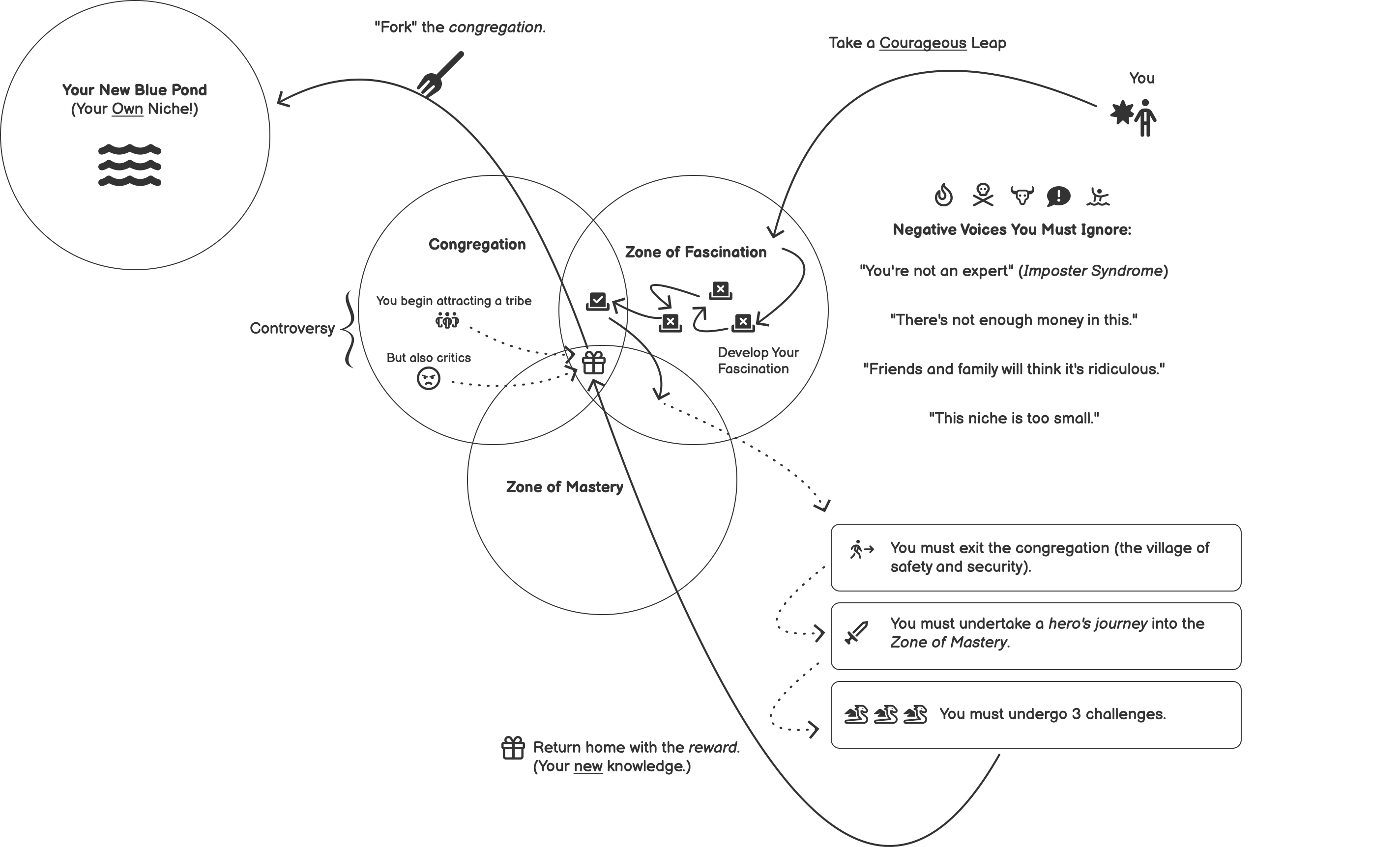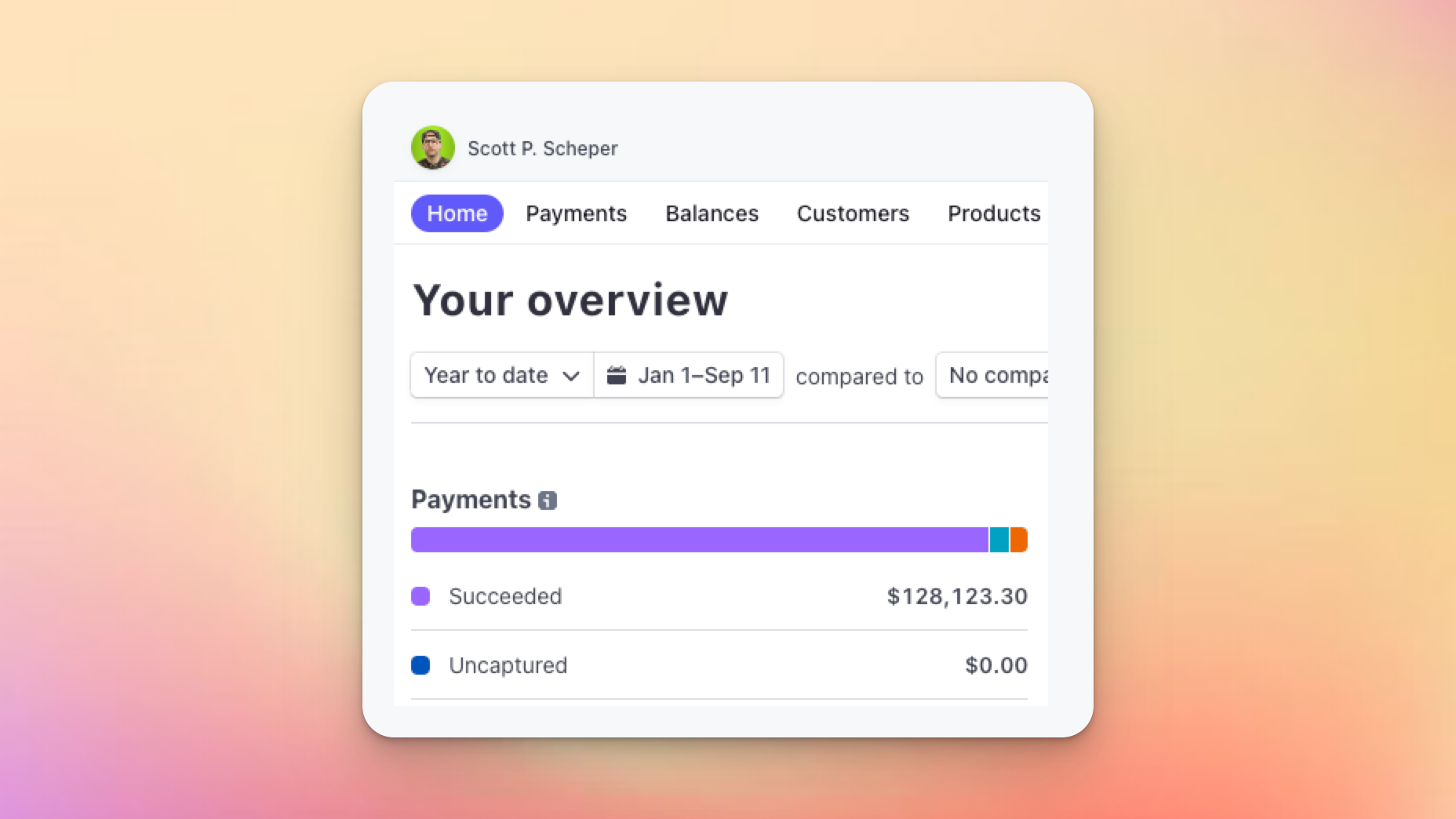Don't "Find" Your Niche, "Develop" It
I would like to share the worst piece of advice you will ever hear when it comes to "finding" your niche.
After I share it with you, I will proffer the best piece of advice that you will ever come across.
In fact, after you finish reading this piece, you will finally have peace in knowing you're on the right track.
You're about to have the "ultimate roadmap" for finding your niche. And even if you already have a niche——what I'm about to teach you will get you to your desired goal faster.
As an independent writer, creator, or entrepreneur——the most important thing you get right is...
YOUR NICHE!
But let's get back to the matter at hand.
The matter at hand is me sharing the worst piece of advice you'll ever hear with regard to "finding" your niche.
Here it is:

This diagram is what you'll get when you Google, "How to find a niche." It's also the typical diagram you'll find in career-related books.
Why is this such bad advice? There are three reasons.
First, there is no "sequence." That is, this diagram offers no order that you should follow. You're not told what you should do first. As a result, you're left wondering if you should focus on finding something that has "a market," or on something "you're good at."
Second, the diagram doesn't give you any sense of which circle you should prioritize. You're left wondering if each of the questions in the circle is of equal importance. (Hint: they're not.)
And last, the diagram makes you think it's about "finding" a niche. It makes you think that it's simply about lining up all those itty-bitty circles and "selecting" a niche that fulfills all three.
In reality, this couldn't be further from the truth. You see, "finding" your niche looks more like this diagram:

First, you need to take a courageous leap.
You need to ignore the negative voices of self-doubt, and you need to ignore feelings of "imposter syndrome."
Next, you need to begin exploring the odd thing(s) you find fascinating. I call this phase, the "Zone of Fascination."
Next, you must find a congregation of people who share your irrational fascination. For myself, I found this in r/Zettelkasten.
After this, you need to exit the congregation and go deeper than anyone else in a specific area. You must undergo three challenges. Think of these as "quests" in a hero's journey.
For myself, I went on quests down some very deep rabbit holes in terms of research. Specifically: (1) Niklas Luhmann's Online Zettelkasten Archive, (2) the paper Communication with Noteboxes by Niklas Luhmann, and (3) the academic paper written by Johannes Schmidt titled, Niklas Luhmann‘s Card Index: Thinking Tool, Communication Partner, Publication Machine.
After this I returned to my congregation and shared what I had learned, and what many of them had interpreted incorrectly.
And this brings us to the final stage...
The stage I call "Forking the Congregation."
After you return home, you will begin attracting your first critics——but you will also start attracting your first set of followers (your first disciples).
From this, it will become clear that these new followers share your beliefs. You have effectively engineered a new belief system——one that conflicts with the old.
In this state, you're presented with a few options.
You could just roll up your sleeves and debate people in your congregation. But doing such will get you nowhere. People are so entrenched in their beliefs (thanks to the sunk-cost fallacy) that they'll ignore every bit of evidence that conflicts with their beliefs (thanks to confirmation bias).
Therefore, what I suggest you do instead is...
"FORK" THE CONGREGATION!
Here's what I mean: In software development, it's a common practice to take a codebase, clone it, and then customize it to your heart's desire. This act is called "forking." You stick a fork in the road, and you create an alternative path forward.
This is what we'll be doing with our congregation.
You need to essentially "fork" your congregation by creating a new path for people to follow.
In practical terms, this means creating a new subreddit or a new forum.
This is precisely what I did, and it's why the analog Zettelkasten congregation finds itself encompassed in the Antinet subreddit (r/antinet).
Forking the congregation is critical, and there are many reasons why. One reason is that doing so will allow you to control your own destiny.
You see, there is a moderator in the Zettelkasten subreddit who hates me. If I even mention the term "Antinet," there's a risk of my account being banned.
One time, this "fraud mod" banned me from the Zettelkasten subreddit for one-hundred days. Why? Because he accused me of creating a bot army——a group of automated accounts that posted links to my YouTube videos. (This was complete rubbish.) In reality, he couldn't believe how I've been able to create a rabid movement of superfans who authentically share my YouTube videos across the Zettelkasten subreddit!
Thankfully, I had already forked the congregation.
I had created the Antinet subreddit about a year earlier and it's been growing ever since.
By doing this, I have effectively created a new pond instead of "battling it out" in a red ocean filled with sharks.
By forking my own congregation, I've created a beautiful new pond——a pond that contains members that have shared values and are committed to growth and learning.
Over time, more rivers will flow into this new pond, and one day it may even become a blue ocean.
I have created a fantastic niche for myself. A niche of people who enjoy PKM, and Zettelkasten, and enjoy using analog tools to manage their knowledge.
This niche is called the "Antinet."
If you thought making money as an independent writer, creator, and thinker wasn't possible, think again.
For the past year I've made my living from this niche. My tribe of superfans have supported me, and I've generated multiple six figures thanks to my community.
Here's a screenshot of this year so far:

You can make a fantastic living even from the teeniest tiniest niche imaginable (I'm talking analog notecards).
This piece describes how I've been able to "find" my niche——and I assure you——I didn't find it through some mechanistic process of lining up three circles.
I hope this gives you some encouragement as you develop your own niche going forward.
Warm regards,
And always remember,
To stay crispy, my friend.

© Scott P. Scheper.
All Rights Not Not Reserved.